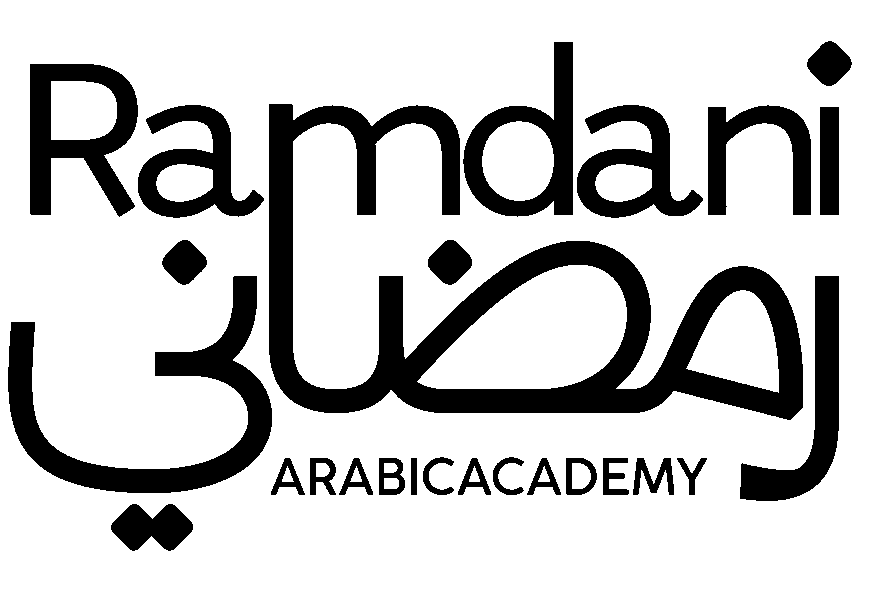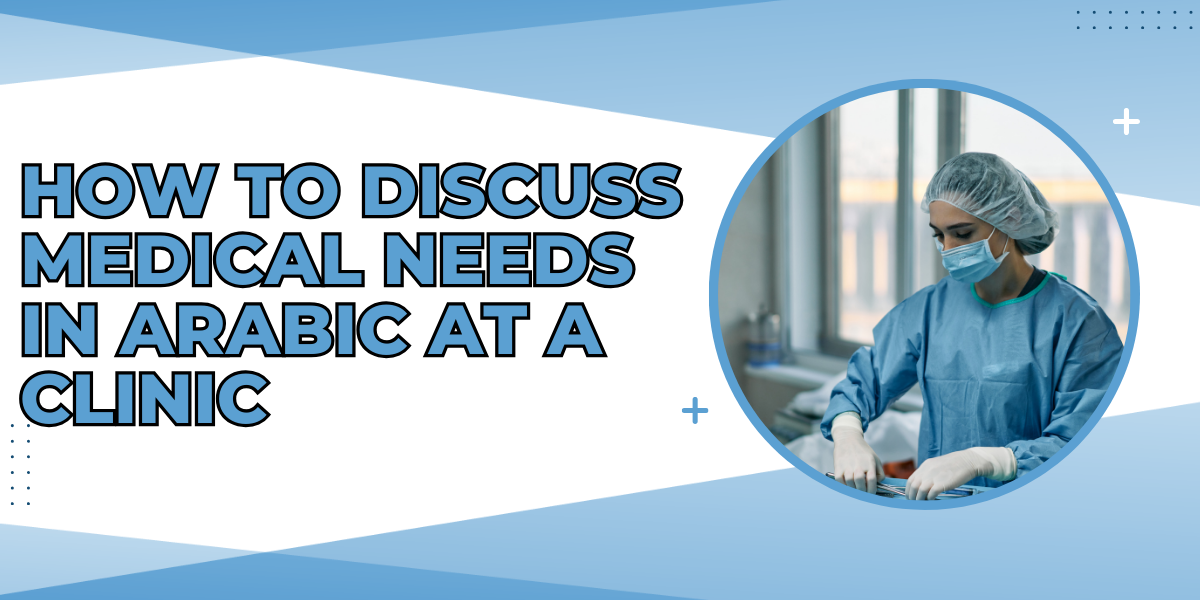How to Discuss Medical Needs in Arabic at a Clinic
Visiting a clinic can feel stressful, especially when you must explain your health problems in a language that is not your own. If you are learning Arabic, this situation may seem even more challenging. How do you describe pain, ask for medicine, or understand what the doctor is saying? These moments are where your Arabic skills become practical and valuable.
Arabic is spoken by more than 300 million people across more than 20 countries. It is the official language in much of the Middle East and North Africa, where medical systems often operate in Arabic. Whether you are a traveler, an expatriate, or a student living abroad, being able to discuss medical needs in Arabic can make a huge difference in the quality of care you receive. It can also give you confidence and independence, helping you avoid misunderstandings that could affect your health.
This article will guide you through the most common words, expressions, and conversations you might face when visiting a doctor or clinic in an Arabic-speaking country. We will look at key vocabulary for symptoms, medical specialties, and basic questions that doctors and nurses often ask. We will also cover polite expressions that will help you sound respectful and clear.
Many Arabic learners focus on topics like travel, shopping, and greetings, but they overlook medical situations until an urgent need arises. Imagine feeling sick in Cairo or Amman, not knowing how to say “I have a headache” or “I am allergic to penicillin.” These moments can quickly turn a small problem into a serious one. Learning this vocabulary before you need it can save time and reduce stress.
This topic is not only for travelers. Even online consultations with Arabic-speaking doctors are becoming common. Telemedicine has grown worldwide, and many Arabic-speaking doctors serve patients in Europe, North America, and Asia. Being able to discuss symptoms accurately in Arabic can help avoid errors in translation or misunderstanding when medical decisions are being made.
Another important point is culture. Clinics in Arabic-speaking countries may follow certain customs and communication styles that differ from what you are used to. Using polite phrases, understanding gender roles in communication, and respecting local etiquette can help you build trust with medical staff. Language is not only about words but also about relationships.
Throughout this article, we will approach the topic step by step, starting with the most common phrases and moving to more specific cases like emergencies or pharmacy visits. Each section will include examples that you can practice on your own. The goal is to prepare you for real-life situations so you feel calm, clear, and confident when you need medical help in Arabic.
By the end of this guide, you will know how to introduce yourself, explain your problem, answer a doctor’s questions, and understand basic instructions about treatment or medication. This knowledge is a valuable skill that supports your health and safety whenever you are in an Arabic-speaking environment.
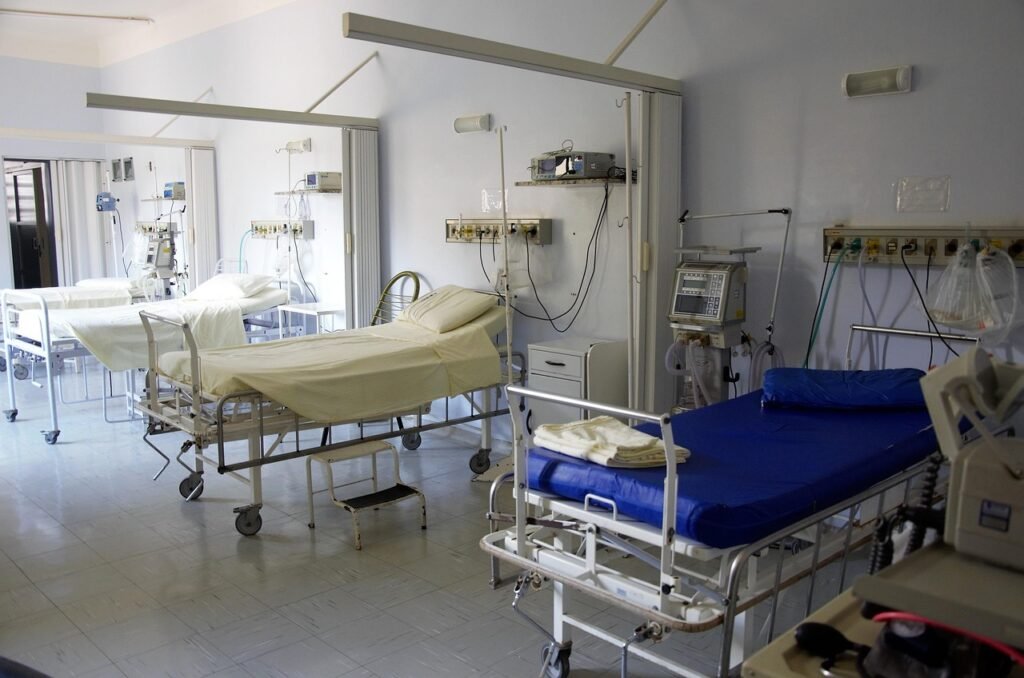
Part 1 – Essential Vocabulary and Phrases for the Clinic
The first step in discussing medical needs in Arabic is learning the basic vocabulary that you will hear and use at a clinic. This includes words for body parts, common symptoms, and useful verbs. Once you know these, you can start forming clear and simple sentences that doctors and nurses will understand.
Key Vocabulary for Body Parts
Knowing how to name body parts helps you explain where you feel pain or discomfort. Here are the most common terms:
- Head – رأس (ra’s)
- Eye – عين (ʿayn)
- Ear – أذن (udhun)
- Nose – أنف (anf)
- Mouth – فم (fam)
- Throat – حلق (ḥalq)
- Chest – صدر (ṣadr)
- Stomach – معدة (maʿida)
- Back – ظهر (ẓahr)
- Arm – ذراع (dhirāʿ)
- Hand – يد (yad)
- Leg – ساق (sāq)
- Foot – قدم (qadam)
You can practice by pointing to each body part and saying its name out loud. This helps you remember quickly when you need it.
Vocabulary for Common Symptoms
Next, focus on words that describe how you feel. These will help you explain your condition to the doctor.
- Pain – ألم (alam)
- Fever – حمى (ḥummā)
- Cough – سعال (suʿāl)
- Cold – زكام (zukām)
- Headache – صداع (ṣudāʿ)
- Stomach ache – ألم المعدة (alam al-maʿida)
- Nausea – غثيان (ghathayān)
- Vomiting – تقيؤ (taqayyuʾ)
- Diarrhea – إسهال (ishāl)
- Allergy – حساسية (ḥasāsiyya)
- Infection – عدوى (ʿadwā)
- Fatigue – تعب (taʿab)
- Dizziness – دوخة (dawkha)
These terms allow you to give short but clear descriptions like “I have a headache” or “I feel tired.”
Useful Verbs for Medical Conversations
Verbs help you explain actions like taking medicine or needing help.
- To feel – أشعر (ashʿur)
- To have – عندي (ʿindī)
- To hurt – يؤلمني (yuʾlimunī)
- To need – أحتاج (aḥtāj)
- To take – آخذ (ākhudh)
- To vomit – أتقيأ (ataqayyaʾ)
- To faint – أغشى عليّ (ughshā ʿalayya)
Common Questions You May Hear
Doctors often ask similar questions no matter which country you are in. Learning these in Arabic helps you understand what is being asked and answer correctly.
- What is wrong? – ما المشكلة؟ (mā al-mushkila?)
- Where does it hurt? – أين الألم؟ (ayna al-alam?)
- How long have you felt this? – منذ متى تشعر بهذا؟ (mundhu matā tashʿur bihādhā?)
- Do you have allergies? – هل عندك حساسية؟ (hal ʿindaka ḥasāsiyya?)
- Are you taking any medication? – هل تأخذ أي دواء؟ (hal taʾkhudh ayy dawāʾ?)
- Do you have fever? – هل عندك حمى؟ (hal ʿindaka ḥummā?)
When you recognize these questions, you can prepare short answers such as “Yes,” “No,” or “Since yesterday.”
Sample Phrases to Use
Once you know the vocabulary, you can combine words into simple, clear sentences.
- I have a headache. – عندي صداع (ʿindī ṣudāʿ)
- I feel tired. – أشعر بالتعب (ashʿur biltʿab)
- My stomach hurts. – معدتي تؤلمني (maʿidatī tuʾlimunī)
- I need a doctor. – أحتاج إلى طبيب (aḥtāj ilā ṭabīb)
- I am allergic to penicillin. – عندي حساسية من البنسلين (ʿindī ḥasāsiyya min al-binsilīn)
- I have been sick for two days. – مريض منذ يومين (marīḍ mundhu yawmayn)
Try saying these sentences slowly and clearly. Most doctors and nurses will be patient when they hear you making an effort to speak Arabic.
Practice Tips
You can practice these words and sentences daily. Write them on flashcards, record yourself speaking them, or role-play a doctor’s visit with a friend or teacher. Repetition helps you remember when you are stressed or in pain.
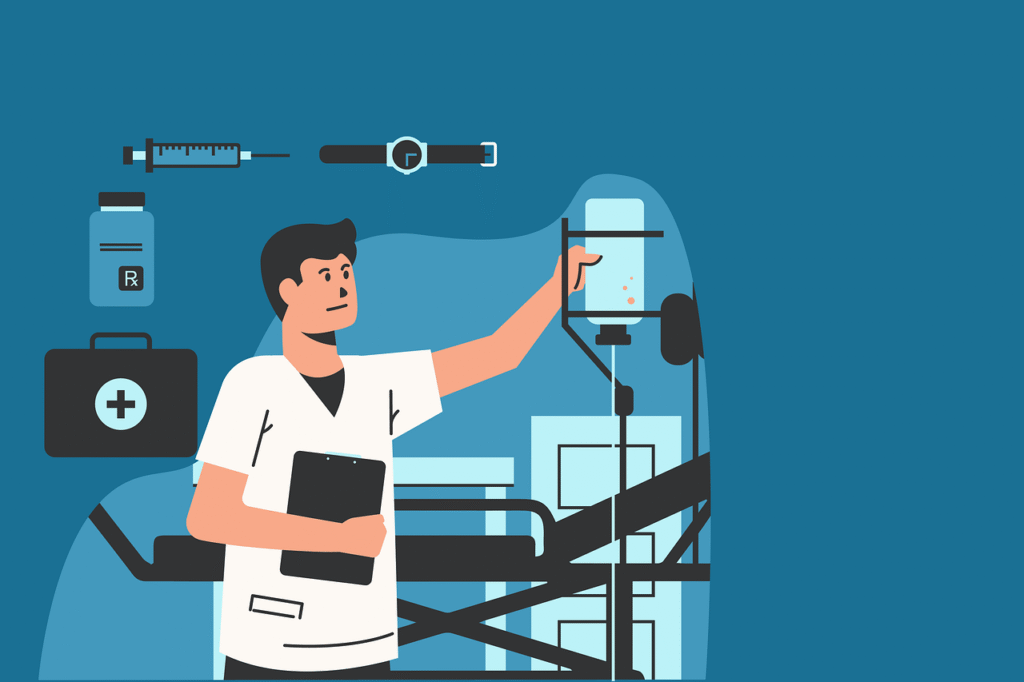
Part 2 – Handling Real Sitations: Emergencies, Pharmacies, and Hospitals
Learning vocabulary is the first step. The next step is practicing how to use it in real situations. Clinics, hospitals, and pharmacies in Arabic-speaking countries follow certain routines that you can prepare for.
Emergency Situations
Emergencies can be stressful, so it helps to know what to say quickly.
Important Words for Emergencies
- Help – مساعدة (musāʿada)
- Ambulance – إسعاف (isʿāf)
- Emergency – حالة طارئة (ḥāla ṭāriʾa)
- Accident – حادث (ḥādith)
- Blood – دم (dam)
- Unconscious – فاقد الوعي (fāqid al-waʿy)
Phrases You Can Use
- Call an ambulance. – اتصل بالإسعاف (ittasil bil-isʿāf)
- I need help. – أحتاج مساعدة (aḥtāj musāʿada)
- Someone is hurt. – شخص مصاب (shakhs muṣāb)
- I am bleeding. – أنا أنزف (anā anzif)
- He lost consciousness. – فقد الوعي (faqad al-waʿy)
If you memorize these phrases, you can act fast when you or someone else is in danger.
At the Clinic
Most clinics follow a simple process. You check in, wait your turn, see the doctor, and then pay or pick up medication.
When you arrive, you may need to register your name or show identification. You can say:
- I have an appointment. – لدي موعد (ladayya mawʿid)
- I want to see a doctor. – أريد أن أرى طبيبًا (urīd an arā ṭabīban)
- This is my first visit. – هذه زيارتي الأولى (hādhihi ziyāratī al-ūlā)
During the consultation, try to answer clearly and keep sentences short. You can also ask questions if you do not understand.
- Can you repeat, please? – هل يمكنك التكرار؟ (hal yumkinuka al-tikrār?)
- What does this mean? – ماذا يعني هذا؟ (mādhā yaʿnī hādhā?)
- Is it serious? – هل هو خطير؟ (hal huwa khaṭīr?)
- What should I do? – ماذا أفعل؟ (mādhā afʿal?)
At the Pharmacy
Pharmacies are an important part of healthcare in Arabic-speaking countries. In some places, pharmacists can give you basic medicine without a doctor’s prescription.
Useful Words at the Pharmacy
- Medicine – دواء (dawāʾ)
- Prescription – وصفة طبية (waṣfa ṭibbiyya)
- Antibiotic – مضاد حيوي (muḍādd ḥayawī)
- Painkiller – مسكن (musakkin)
- Syrup – شراب (sharāb)
- Tablet – قرص (qurs)
Questions You Might Ask
- Do you have this medicine? – هل عندكم هذا الدواء؟ (hal ʿindakum hādhā al-dawāʾ?)
- How many times per day? – كم مرة في اليوم؟ (kam marra fī al-yawm?)
- Before or after food? – قبل الأكل أم بعده؟ (qabla al-akl am baʿduh?)
- Any side effects? – هل له آثار جانبية؟ (hal lahu āthār jāniybiyya?)
If you cannot find the exact medicine you need, the pharmacist may offer a local alternative. It is good to confirm the dosage and instructions carefully.
At the Hospital
Hospital visits can be longer and more formal than clinic visits. You may have to deal with multiple departments such as reception, laboratory, or radiology.
Words You May Hear
- Reception – استقبال (istiqbāl)
- Nurse – ممرضة (mumarriḍa)
- Laboratory – مختبر (mukhtabar)
- X-ray – أشعة (ashʿa)
- Test – تحليل (taḥlīl)
- Surgery – عملية (ʿamaliyya)
If you are admitted to a hospital, you may need to communicate with staff more often.
- When will the doctor come? – متى سيأتي الطبيب؟ (matā sayatī al-ṭabīb?)
- Can I have water? – هل يمكن أن أحصل على ماء؟ (hal yumkin an aḥṣul ʿalā māʾ?)
- I am in pain. – أنا أشعر بالألم (anā ashʿur bil-alam)
- I want to call my family. – أريد أن أتصل بعائلتي (urīd an attasil bi-ʿāʾilatī)
Tips for Communicating
- Speak slowly and clearly.
- Repeat key words if the listener does not understand.
- Use gestures to point to the part of the body that hurts.
- Write down important words if needed.
Even if your Arabic is basic, showing that you are trying helps medical staff understand you better.
Part 3 – Cultural Tips and Communication Strategies
Language is not just words. When you go to a clinic or hospital in an Arabic-speaking country, cultural awareness can make your visit smoother. Being polite, using the right tone, and respecting local customs can help you get better service and build trust with medical staff.
Using Polite Expressions
Politeness is very important in Arabic-speaking cultures. People expect greetings and respectful language. Before you talk about your problem, greet the doctor or nurse.
Common Greetings
- Peace be upon you – السلام عليكم (al-salāmu ʿalaykum)
- Good morning – صباح الخير (ṣabāḥ al-khayr)
- Good evening – مساء الخير (masāʾ al-khayr)
When you leave, it is polite to thank them:
- Thank you – شكرا (shukran)
- May God reward you – جزاك الله خيرا (jazāk Allāh khayran)
These small phrases show respect and make the conversation friendlier.
Respecting Gender Norms
In some Arabic-speaking countries, clinics follow gender norms strictly. For example, a female patient may prefer to see a female doctor, or a male doctor might ask if he can examine a female patient.
If you have a preference, you can say:
- I want to see a female doctor. – أريد طبيبة (urīd ṭabība)
- I want to see a male doctor. – أريد طبيبًا (urīd ṭabīban)
Being clear about this at the beginning can avoid awkwardness later.
Body Language and Tone
Arabic communication often uses more formal tone in professional settings. Speak calmly, keep eye contact, and avoid raising your voice. Showing frustration may be seen as disrespectful.
If you do not understand something, do not pretend. Politely ask the doctor to explain. You can say:
- Please explain more. – من فضلك اشرح أكثر (min faḍlik ishraḥ akthar)
- I did not understand. – لم أفهم (lam afham)
Understanding How Doctors Communicate
Doctors in Arabic-speaking countries may not always deliver information the same way you are used to. In some cultures, they may not tell the patient everything directly, especially in serious cases. They may speak to a family member first.
If you want to receive all information directly, you can say:
- Please talk to me directly. – تحدث إليّ مباشرة (taḥaddath ilayya mubāsharatan)
This makes it clear that you want to be informed about your own condition.
Handling Misunderstandings
Even with good preparation, misunderstandings can happen. Stay calm and repeat what you said using simpler words. You can also write things down.
If there is a major problem, ask for a translator:
- Is there someone who speaks English? – هل يوجد من يتحدث الإنجليزية؟ (hal yūjad man yatakallam al-inglīziyya?)
Most hospitals in big cities have staff who can help with translation if needed.
Building Confidence
You do not need to speak perfect Arabic. Most doctors will appreciate your effort. Using even a few words in Arabic shows respect for their language and culture. This can make them more patient and willing to help.
You can practice confidence by rehearsing a short script before you visit:
- Greet the doctor.
- Explain your main problem in one sentence.
- Answer questions with short words or numbers.
- Thank them before leaving.
This simple plan makes the visit less stressful and keeps the conversation focused.
Learning from Each Visit
Every clinic visit is a chance to learn more Arabic. Write down new words you hear, such as names of tests or medicines. Review them later. Over time, your vocabulary will grow, and you will feel more comfortable.
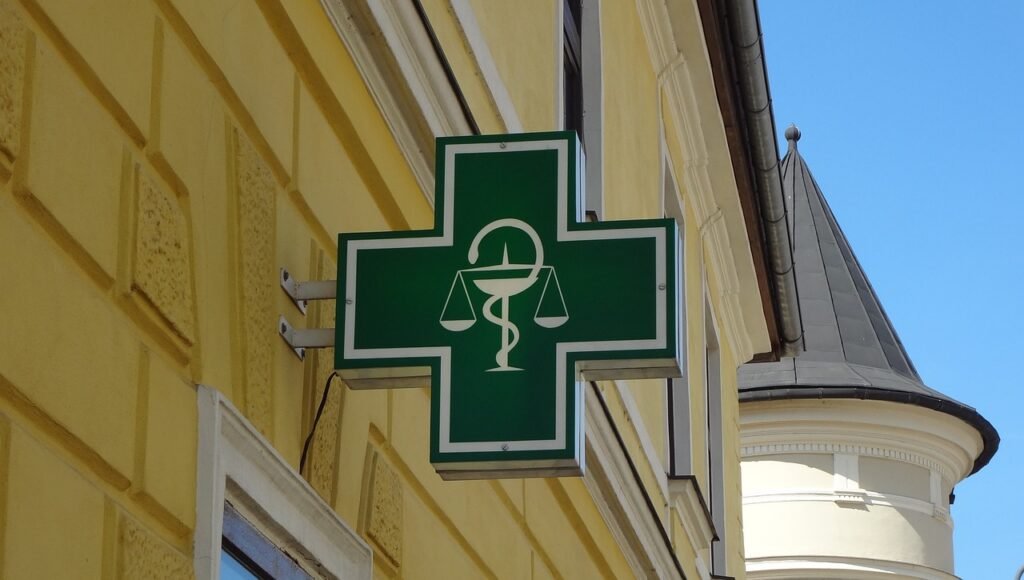
Part 4 – Practical Dialogues and Roleplay Examples
Reading vocabulary lists is helpful, but nothing builds confidence like practicing full conversations. Below are realistic dialogues you can use to prepare for real clinic visits. Each example is short and clear, with phrases you already learned.
Dialogue 1 – Booking an Appointment
Receptionist: السلام عليكم (al-salāmu ʿalaykum)
You: وعليكم السلام. لدي موعد مع الطبيب. (wa ʿalaykum al-salām. ladayya mawʿid maʿa al-ṭabīb.)
Receptionist: ما اسمك؟ (mā ismuk?)
You: اسمي جون. (ismī John.)
Receptionist: تفضل بالجلوس حتى ينادي عليك. (tafaḍḍal bil-julūs ḥattā yunādī ʿalayk.)
You: شكرا. (shukran.)
This simple exchange helps you check in without confusion.
Dialogue 2 – Explaining Symptoms to the Doctor
Doctor: ما المشكلة؟ (mā al-mushkila?)
You: عندي صداع منذ يومين. (ʿindī ṣudāʿ mundhu yawmayn.)
Doctor: هل عندك حمى؟ (hal ʿindaka ḥummā?)
You: نعم، عندي حمى خفيفة. (naʿam, ʿindī ḥummā khafīfa.)
Doctor: هل عندك حساسية من دواء؟ (hal ʿindaka ḥasāsiyya min dawāʾ?)
You: نعم، عندي حساسية من البنسلين. (naʿam, ʿindī ḥasāsiyya min al-binsilīn.)
Doctor: سنعمل فحص دم. (sanʿmal faḥṣ dam.)
You: جيد. (jayyid.)
This conversation shows how to keep answers short and clear while giving important information.
Dialogue 3 – At the Pharmacy
You: السلام عليكم. عندي وصفة من الطبيب. (al-salāmu ʿalaykum. ʿindī waṣfa min al-ṭabīb.)
Pharmacist: تفضل. (tafaḍḍal.)
You: كم مرة آخذ هذا الدواء؟ (kam marra ākhudh hādhā al-dawāʾ?)
Pharmacist: ثلاث مرات في اليوم بعد الأكل. (thalāth marrāt fī al-yawm baʿd al-akl.)
You: هل له آثار جانبية؟ (hal lahu āthār jāniybiyya?)
Pharmacist: قد يسبب النعاس. (qad yusabbib al-nuʿās.)
You: شكرا جزيلا. (shukran jazīlan.)
Asking about dosage and side effects keeps you safe when taking medicine.
Dialogue 4 – Emergency Situation
You: أحتاج مساعدة! صديقي فقد الوعي! (aḥtāj musāʿada! ṣadīqī faqad al-waʿy!)
Bystander: اتصلنا بالإسعاف. (ittasalnā bil-isʿāf.)
Paramedic: منذ متى فقد الوعي؟ (mundhu matā faqad al-waʿy?)
You: منذ خمس دقائق. (mundhu khams daqāʾiq.)
Paramedic: هل عنده أمراض سابقة؟ (hal ʿindahu amrāḍ sābiqa?)
You: نعم، عنده مرض السكر. (naʿam, ʿindahu maraḍ al-sukkar.)
Being ready with basic health history information can help doctors act quickly.
Dialogue 5 – Follow-Up Visit
Doctor: كيف تشعر اليوم؟ (kayfa tashʿur al-yawm?)
You: أفضل بكثير. (afḍal bikathīr.)
Doctor: هل أخذت كل الدواء؟ (hal akhadhta kull al-dawāʾ?)
You: نعم، انتهيت أمس. (naʿam, intahayt ams.)
Doctor: ممتاز، يمكنك التوقف الآن. (mumtāz, yumkinuka al-tawaqquf al-ān.)
You: شكرا دكتور. (shukran duktūr.)
This type of conversation helps you review your progress and finish treatment safely.
Practice Suggestions
- Role-play with a teacher or friend. Switch roles between doctor, patient, and pharmacist.
- Record yourself saying these dialogues out loud. Listen back and correct pronunciation.
- Change details like symptoms, medication, or length of illness to make new examples.
The more you practice, the easier it becomes to speak without hesitation in real life.
Final Advice
Being able to discuss medical needs in Arabic is not just a language skill — it is a way to protect your health and your peace of mind. Clinics, pharmacies, and hospitals can feel intimidating if you cannot express yourself clearly. By learning the right words, practicing simple sentences, and understanding cultural expectations, you prepare yourself for these moments before they happen.
Here are some final tips to make this knowledge work for you:
- Practice every week. Spend 10 minutes reviewing body parts, symptoms, and basic phrases.
- Use role-play. Imagine yourself at a clinic, say the sentences out loud, and get used to the rhythm of speaking Arabic.
- Write it down. Keep a small notebook or phone note with important words in case you forget under stress.
- Stay calm. Doctors and nurses will appreciate your effort even if your Arabic is not perfect.
- Learn gradually. Start with one or two dialogues and build from there. Consistency matters more than speed.
Medical conversations may seem hard at first, but you will improve each time you use them. Every real-life visit becomes a chance to grow your vocabulary and confidence. Over time, you will be able to describe your symptoms, understand instructions, and even help others in emergencies.
This article was prepared by Ramdani Mohamed, founder of Ramdani Arabic Academy — an online platform dedicated to helping learners master Arabic in a practical, clear, and structured way. Our website offers:
- Comprehensive courses for all levels
- Articles on grammar, vocabulary, and culture
- Real-life conversation guides like this one
- Resources to help you speak confidently in any situation
Our mission is to make Arabic learning simple and useful for students around the world. We believe language is a bridge that opens opportunities for travel, study, and work.
Ramdani Mohamed is a teacher, writer, and passionate advocate for Arabic education. With years of experience working with learners from different countries, he focuses on creating practical materials that students can use immediately in real life. He believes that learning Arabic should be clear, structured, and connected to daily situations — not just textbooks.
